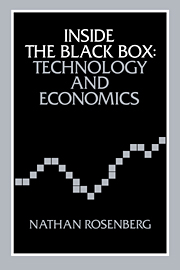Book contents
- Frontmatter
- Contents
- Preface
- Part I Views of technical progress
- 1 The historiography of technical progress
- 2 Marx as a student of technology
- Part II Some significant characteristics of technologies
- Part III Market determinants of technological innovation
- Part IV Technology transfer and leadership: the international context
- Index
1 - The historiography of technical progress
Published online by Cambridge University Press: 08 January 2010
- Frontmatter
- Contents
- Preface
- Part I Views of technical progress
- 1 The historiography of technical progress
- 2 Marx as a student of technology
- Part II Some significant characteristics of technologies
- Part III Market determinants of technological innovation
- Part IV Technology transfer and leadership: the international context
- Index
Summary
To encompass the entire historiography of technical progress in one essay is impossible, even if the essay were allowed to grow far longer than the present one. For, in a fundamental sense, the history of technical progress is inseparable from the history of civilization itself, dealing as it does with human efforts to raise productivity under an extremely diverse range of environmental conditions. Even if we were to define technology in a relatively narrow “hardware” sense–which we will not–and to exclude organizational, institutional, and managerial factors, the range of materials that one might wish to mention would still be disconcertingly large. What follows, therefore, is necessarily highly selective.
This essay will first consider the nature and character of technical progress. Successive sections will then explore the most relevant literature on the rate of technical progress, the direction of technical progress, the diffusion of new technologies, and finally, the impact of technical progress upon productivity growth.
Definition and characterization of technical progress
A central problem in examining technical progress, and one that makes it difficult even to define or characterize readily, is that it takes many different forms. For technical progress is not one thing; it is many things. Perhaps the most useful common denominator underlying its multitude of forms is that it constitutes certain kinds of knowledge that make it possible to produce (i) a greater volume of output or (2) a qualitatively superior output from a given amount of resources.
- Type
- Chapter
- Information
- Inside the Black BoxTechnology and Economics, pp. 3 - 33Publisher: Cambridge University PressPrint publication year: 1983
- 1
- Cited by



